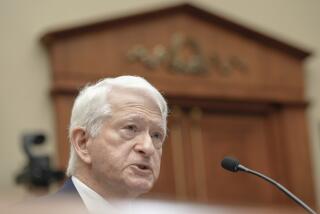Israel’s Knesset Gets Schooled in Civilized Debate
- Share via
JERUSALEM — Debates in the Israeli parliament tend to be known more for their volume than their high tenor. So it was a surprise Thursday to hear speakers in the chambers being painstakingly polite, addressing each other as “Sir” and “Ma’am” and hewing to the rules of order as they conducted an emotional discussion on prosecuting Nazi war criminals.
They lapsed from their strict behavior only twice: One speaker suggested his adversary might benefit from a thorough ear-cleaning; another dismissed an opponent’s rebuttal as “simply ridiculous.”
Not surprisingly, these decorous disputants were not the usual inhabitants of the Knesset, as the parliament is called, but high school students participating in an international debate competition. And many of those who watched--including ambassadors, educators and journalists--reveled in the sight of such civilized conduct occurring in a setting often associated with raucousness.
“We are here for two reasons: to celebrate Israel’s democracy and because we need to be educated . . . about how to present political opinions forcefully without being entirely rude,” lawmaker Naomi Hazan cheerfully told those at the World Schools Debating Championship, held in Israel for the first time. “We are depending heavily on you to instruct us.”
But in a nation known for its lively discourse, that might be a herculean task, especially in the Knesset, where the readiness to offer opinions, often in personal, passionate style, is only too evident.
The 120 Israeli lawmakers hurl insults across the chamber, calling each other “fascist,” “racist,” “parasite” and worse. Speeches are interrupted, fingers are waggled in faces, and members often stomp out, interrupting debate.
One well-respected religious party member, frustrated by the defeat of a bill last week that would have benefited his ultra-Orthodox constituency, angrily accused opponents of being “anti-Semites” and “trash.” Another lawmaker, shocked by those remarks of Rabbi Avraham Ravitz of the United Torah Judaism party, asked plaintively, “Am I an anti-Semite too?”
Ravitz, chairman of the Budget Committee, shouted back at Emanuel Zissman: “They are anti-Semites. You are a little anti-Semite!” He later apologized; it was the retraction, not the language, that was rare.
In another recent incident, Rehavam Zeevi, a member of the far-right Moledet party, added his own fillip to debate on whether Palestinian Authority President Yasser Arafat should have been invited to visit the U.S. Holocaust Memorial Museum on his recent Washington trip. Zeevi, who opposed the invitation, was heckled by Israeli Arab lawmakers who supported it. “You’re not even neo-Nazis,” he yelled at them. “You’re Nazis!”
While its chaotic debates sometimes embarrass Israelis, they also laugh with and at the Knesset. And so far, its heated arguments, unlike in some countries’ congresses, have not come to blows.
Many Israelis also understand the strong emotions so evident in Knesset debates. They point to the splintered nature of the parliament, with 15 parties and factions now represented, and to the deep rifts in Israeli society along ethnic, religious and social lines. And they say there is an overriding sense here that the stakes in political decisions may be higher than in other democracies.
Where other nations debate matters like health care, budgets and education, Israelis also tackle fundamental questions about their nation’s religious-secular identity and efforts to make peace with its neighbors. “People feel these are life-and-death matters,” said columnist and author Zeev Chafets. “It’s hard to blame them for reacting pretty strongly.”
Moshe Halbertal, a professor of Jewish thought and philosophy at Jerusalem’s Hebrew University, observed: “In a society where each end of the spectrum sees the other as a threat to the state’s existence, it’s actually a tribute to the strength of our democratic institutions that we’ve managed to maintain that tradition.”
Debate is a traditional part of Jewish studies, Halbertal noted. Classes at Jewish seminaries split up into pairs or small groups to study the Talmud, the writings that make up Jewish law, and debate interpretations. The Talmud itself includes what are essentially minority opinions on parts of the code, thus legitimizing dissent, Halbertal said. “We’ve been arguing since the beginning,” he said. “But not like the Knesset.”
Many who watched Thursday as Australia’s team barely defeated another from Scotland said that lawmakers could have learned much from the students. They made their arguments clearly, concisely and with courtesy, Chazan said admiringly when it was over. What a shame, she added, that only two Knesset members had bothered to listen.
More to Read
Sign up for Essential California
The most important California stories and recommendations in your inbox every morning.
You may occasionally receive promotional content from the Los Angeles Times.













